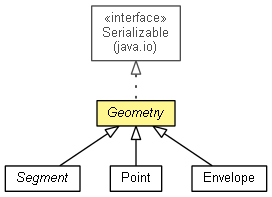 com.esri.core.geometry.Geometry
com.esri.core.geometry.Geometry
|
||||||||||
| PREV CLASS NEXT CLASS | FRAMES NO FRAMES | |||||||||
| SUMMARY: NESTED | FIELD | CONSTR | METHOD | DETAIL: FIELD | CONSTR | METHOD | |||||||||
java.lang.Objectcom.esri.core.geometry.Geometry
public abstract class Geometry

Common properties and methods shared by all geometric objects. Geometries are objects that define a spatial location and and associated geometric shape.
| Nested Class Summary | |
|---|---|
static class |
Geometry.Type
The type of this geometry. |
| Field Summary | |
|---|---|
protected com.esri.core.geometry.VertexDescription |
m_description
an object which describes the vertex format of the Geometry. |
protected int |
m_touchFlag
a synchronized integer to track the state of the geometry. |
| Method Summary | |
|---|---|
protected Object |
_getImpl()
Returns implementation class of the geometry. |
abstract void |
applyTransformation(Transformation2D transform)
Applies 2D affine transformation in XY plane. |
double |
calculateArea2D()
Calculates the area of the geometry. |
double |
calculateLength2D()
Calculates the length of the geometry. |
Geometry |
copy()
Creates a copy of the geometry. |
abstract void |
copyTo(Geometry dst)
Copies this geometry to another geometry of the same type. |
abstract int |
getDimension()
Returns the topological dimension of the geometry object based on the geometry's type. |
static int |
getDimensionFromType(int type)
Returns an integer for this geometry's dimension. |
int |
getStateFlag()
Returns the state of the geometry. |
abstract Geometry.Type |
getType()
Returns the geometry type. |
static boolean |
isArea(int type)
Indicates if the integer value of the enumeration is an area (dimension 2). |
abstract boolean |
isEmpty()
Indicates if the geometry object contains geometric information. |
static boolean |
isLinear(int type)
Indicates if the integer value of the enumeration is linear (dimension 1). |
static boolean |
isMultiPath(int type)
Indicates if the integer value of the enumeration is a multipath (ie, line or area). |
static boolean |
isMultiVertex(int type)
Indicates if the integer value of the enumeration is a multivertex (ie, multipoint, line, or area). |
static boolean |
isPoint(int type)
Indicates if the integer value of the enumeration is a point type (dimension 0). |
static boolean |
isSegment(int type)
Indicates if the integer value of the enumeration is a segment. |
abstract void |
queryEnvelope(Envelope env)
Gets the axis aligned bounding box of the geometry. |
abstract void |
setEmpty()
Sets the geometry to its original initialization state by releasing all data referenced by the geometry. |
| Methods inherited from class java.lang.Object |
|---|
clone, equals, finalize, getClass, hashCode, notify, notifyAll, toString, wait, wait, wait |
| Field Detail |
|---|
protected com.esri.core.geometry.VertexDescription m_description
protected volatile int m_touchFlag
| Method Detail |
|---|
public abstract Geometry.Type getType()
public abstract int getDimension()
Returns 0 for point and multipoint.
Returns 1 for lines and polylines.
Returns 2 for polygons and envelopes
Returns 3 for objects with volume
public abstract void queryEnvelope(Envelope env)
env - The envelope to return the result in.public abstract boolean isEmpty()
public abstract void setEmpty()
public abstract void applyTransformation(Transformation2D transform)
transform - The affine transformation to be applied to this geometry.public abstract void copyTo(Geometry dst)
GeometryException - invalid_argument if the geometry is of different type.public double calculateArea2D()
public double calculateLength2D()
GeometryEngine.
protected Object _getImpl()
public static int getDimensionFromType(int type)
Returns 0 for point and multipoint.
Returns 1 for lines and polylines.
Returns 2 for polygons and envelopes
Returns 3 for objects with volume
type - The integer value from geometry enumeration. You can use the method Geometry.Type.value() to get at the integer value.
public static boolean isPoint(int type)
type - The integer value from geometry enumeration. You can use the method Geometry.Type.value() to get at the integer value.
public static boolean isLinear(int type)
type - The integer value from geometry enumeration. You can use the method Geometry.Type.value() to get at the integer value.
public static boolean isArea(int type)
type - The integer value from geometry enumeration. You can use the method Geometry.Type.value() to get at the integer value.
public static boolean isSegment(int type)
type - The integer value from geometry enumeration. You can use the method Geometry.Type.value() to get at the integer value.
public static boolean isMultiVertex(int type)
type - The integer value from geometry enumeration. You can use the method Geometry.Type.value() to get at the integer value.
public static boolean isMultiPath(int type)
type - The integer value from geometry enumeration. You can use the method Geometry.Type.value() to get at the integer value.
public Geometry copy()
public int getStateFlag()
|
||||||||||
| PREV CLASS NEXT CLASS | FRAMES NO FRAMES | |||||||||
| SUMMARY: NESTED | FIELD | CONSTR | METHOD | DETAIL: FIELD | CONSTR | METHOD | |||||||||